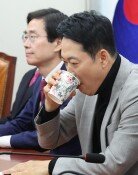Legal Dispute Erupts Over Alternative Medicine
Legal Dispute Erupts Over Alternative Medicine
Posted December. 18, 2009 08:59,
A dispute has erupted over alternative medicines place in the countrys medical sector given that it does not fall under either modern or Oriental medicine.
Often called folk or natural remedies in Korea, alternative medicine comprises 70 kinds of treatment. If national, folk and traditional medicine are added, the number of alternative treatments is in the hundreds.
Experts estimate the alternative medicine market in Korea is worth more than 10 trillion won (8.4 billion U.S. dollars) per year. Advocates of the sector call it an alternative to modern medicine, while opponents say it lacks scientific grounds and that its remedial value cannot be verified.
At the center of the controversy lies Kim Nam-soo, who had practiced acupuncture and moxibustion in Korea since opening Namsoo Acupuncture Clinic in 1943. He treated countless numbers of patients.
Ddeumsarang (Love for Moxibustion), a volunteer organization that provides acupuncture and moxibustion, has thousands of members.
Kim, however, stopped treating patients last year after being indicted for practicing moxibustion without a license. Because more people began learning acupuncture and moxibustion from Kim and the two treatments grew in popularity, doctors of Oriental medicine accused him of violating medical law.
Article 27 of the law stipulates that only certified medical staff can provide medical intervention and that if certified, they cannot conduct medical practices if their licenses are suspended.
Based on this, Kim is being sued by many plaintiffs. He has since moved to the U.S. to continue his practice.
Three cases on unlicensed medical intervention against Kim are pending with the Constitutional Court. One is a petition filed by one of his supporters.
The Constitutional Court opened Saturday a hearing on the provision of the medical law that bans those unlicensed from practicing alternative medicine.
The Busan District Court requested the Constitutional Court to rule on the provisions constitutionality at the request of a person indicted for practicing alternative medicine unlicensed.
An acupuncture practitioner and a person who treated people with magnets also filed a petition with the Constitutional Court.
The Busan court said, Banning all unlicensed medical activities regardless of effectiveness is excessive regulation and a violation of a patients right to survive and get treatment.
The Health, Welfare and Family Affairs Ministry, however, said, The medical license system is the minimum the government must do to protect the life and health of the people from reckless medical intervention.







